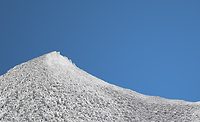
- Adhesives
- Soft and hard rubber compounds
- Plastics
- Protective coatings
- Traffic paints
- Joint compounds
- Fiberglass
- Refractories
The special use of South Carolina air-floated kaolin, as it is being marketed today, is as a reinforcing agent. K-T Clay is mining one of the few clay deposits of commercial quality and extent in the United States and the world, which is found in a narrow 50-80-kilometer-wide belt stretching from near Columbia, SC, to Macon, GA.
There are two general classifications of kaolin clays. Based on their effects on a compound imparted stiffness, these clays are designated as hard and soft kaolin clays.
Hard Kaolin Clays
Hard kaolin clays have lower median particle size distribution and higher surface area. Industrial applications include hard rubber compounds, plastics, adhesives and a variety of protective coatings. Hard kaolin clays offered by K-T Clay include Barden LGB-1, Suprex and Barden R.Soft Kaolin Clays
These clays have higher median particle size distribution and lower surface area. The lower uncured viscosity permits significantly higher loadings of filler, which result in additional cost savings. Soft kaolin clays offered include Paragon and Alumex.
Both hard and soft clay types are commonly used where economical processing and compound reinforcement are required.
Selecting a Kaolin Filler
The selection of a particular kaolin filler for an adhesive compound depends on the processing characteristics and physical properties desired, the cost, and the final performance of the finished product. For example, many fillers may reduce cost and have good properties, but the performance given may not match that of a higher cost, quality-controlled filler. The compounder has to start with the best possible raw materials and then adjust the compound to meet product specifications and cost.
The use of the above forms of South Carolina air-floated kaolin clay gives the adhesive producer the opportunity to significantly improve the performance characteristics of finished products. Through careful selection and experimentation, kaolin can further reinforce and enhance adhesive properties that few mineral fillers can match.
For more information on kaolin clays, contact Kentucky-Tennessee Clay (K-T Clay) Co., phone (800) 472-2529; fax (803) 593-4144; e-mail langleycustserv@k-tclay.com; or visit http://www.k-tclay.com.
References
1. Kentucky-Tennessee Clay Co., "Kaolin Filler Extenders" Brochure, July 1997.2. Sutton, D. "Air-floated Kaolin- Not Just Another Filler," Rubber Division, American Chemical Society (Nashville), September 29-October 2, 1998.



